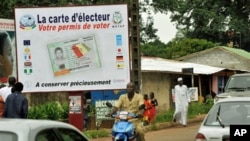Guinea prepares to go the polls Sunday for what many hope will be the country's first free and fair presidential election.
Sunday's poll is meant to return Guinea to civilian government after a military junta seized power in December 2008. A successful vote could mark the end of more than 50 years of dictatorial rule in the West African country.
What has been a lively six weeks of campaigning for the 24 presidential hopefuls ends Friday at midnight.
At a rally earlier this week, candidate Alpha Conde, said "long live the generation of 2010 and long live our economic independence. Long live Guinean pride," he said. "Together we will change Guinea."
Conde is considered a frontrunner in the race along with candidates and former prime ministers, Cellou Dalein Diallo and Sidya Toure.
In Coyah, 50 kilometers outside Conakry, a confrontation Thursday between Diallo and Toure's supporters left at least 20 people injured, mainly from thrown rocks.
It was the first incident in what has been applauded by observers as a largely positive and peaceful campaign. Optimism is high, but concerns remain that fighting could break out between supporters of different political parties once results are announced.
Plumber Daura Conde says "we want peace and we don't want those who lose the elections to be upset." He says that is not the way it should be. He says "we don't want war in this country. We want equal rights in this country, he says, so those who lose the elections must accept defeat." He says, in football, there's a winner and a loser and you must accept the outcome.
Members of the transitional government organizing the elections were not eligible to run, and military authorities have pledged that soldiers will remain in their camps on voting day.
A special force of 16,000 police and security officers, called Fossepel, was created in May to secure the electoral process.
Fossepel Commander, Ibrahima Balde, said "we have waited a long time for transparent, credible elections that can pull this country out of all the trouble we have known in the past." He says citizens need to pull themselves together and remember that no matter how much they support their candidates, there will be only one elected winner.
The election is part of a greater period of transition for Guinea. Observers say many weighty challenges await the new president, including reforms to the military and judicial system, as well as improved health and education services.
Saran Daraba Kaba, the only female presidential candidate, says Guinea will have to become an ordinary country once again. She says an ordinary country is a country where the institutions are strong, where there is a real separation of powers, and where the legislator really turns the citizens' problems into his or her own.
If no candidate wins a clear majority in Sunday's vote, a run-off between the two top-scoring candidates is planned for July 18.
Guinea Prepares to Elect President




